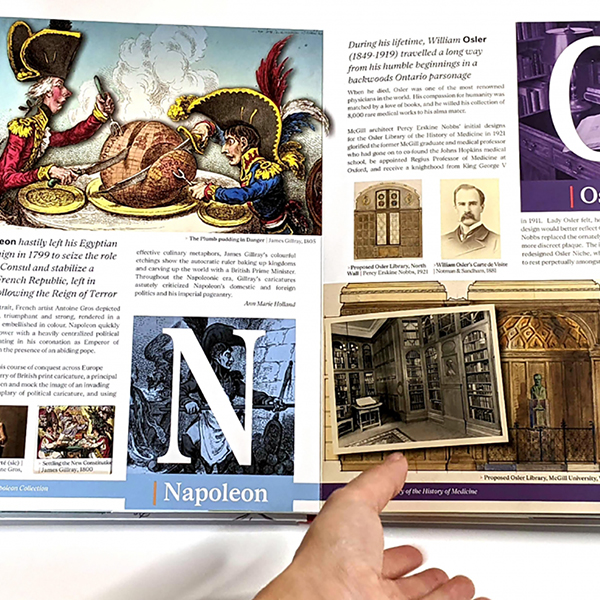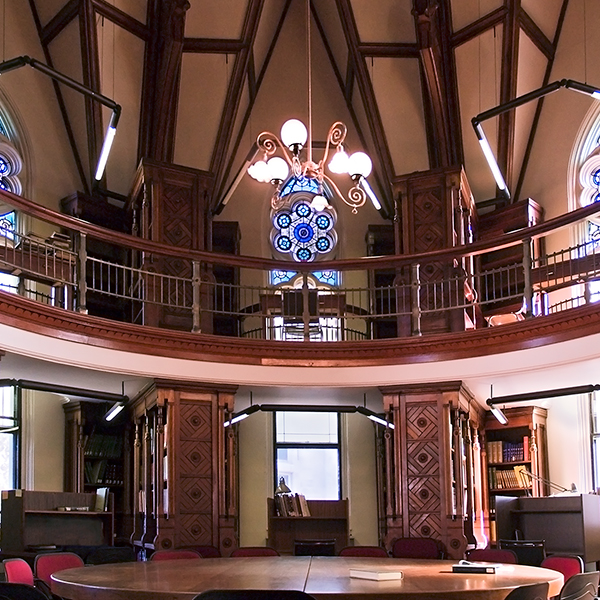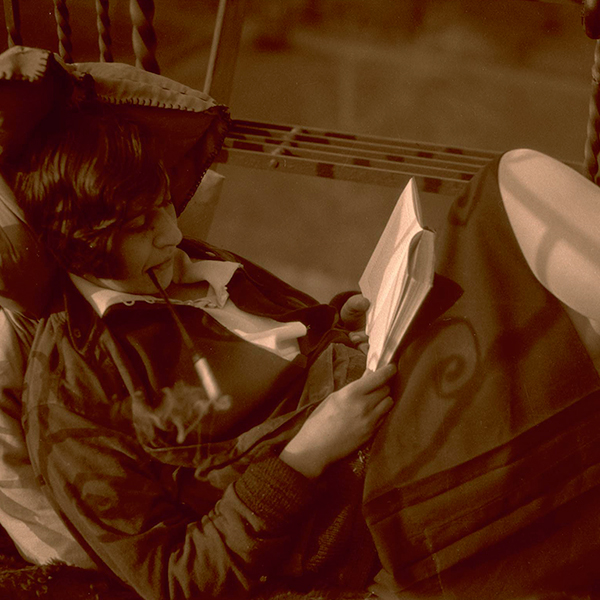Great libraries are much more than the sum of their books. The collections and archives at the McGill Library are a perfect example.
Yes, there are six million or so books, and by some estimates as many as one in five might be classified as rare. But the true strength of McGill’s collections are the identity they help create for the University and its community.
To celebrate the role that the McGill Library has played, and to bring into view the accessibility of its collections, a series of conversations begins October 2 led by Alberto Manguel, a world-class aficionado of books, libraries and reading. It features prominent writers and scholars in six talks with Manguel that focus on various objects in McGill’s collections.
Here’s an example of how it works: the Maude Abbott Medical Museum contains what Manguel calls “the most curious object in the whole of [McGill’s collections] – nails [fused together] taken out of the stomach of a metal swallower. It looks like a piece of primitive sculpture.”
![Nails [fused together] taken out of the stomach of a metal swallower, as seen in the McGill Library collection](https://mcgillnews.mcgill.ca/wp-content/uploads/2024/01/Nails-Inline.jpg)
These objects (see left) provides a departure point for a discussion between Manguel and writer Susan Swan, BA’67, on the intersection of medicine and show business in the 18th and 19th centuries. Freaks and wonders – “human zoos” – were a staple of the travelling carnival, but they also attracted the attention of a medical profession feeling its way to greater understanding of human physiology and psychology.
Who better to take part in this conversation than Swan, author of The Biggest Modern Woman of the World, about a giantess from Nova Scotia who appeared in P.T. Barnum’s circus?
And so it goes as Manguel delves into various corners of the McGill Library’s collections. Other subjects include Quebec detective fiction (with Andrée A. Michaud), Yiddish writers in Quebec (Esther Frank, MA’76, and Sebastian Schulman, BA’06), Sir William Dawson, the 19th century McGill principal (Aritha van Herk), Rudyard Kipling’s world (Anita Rau Badami) and children’s books and fairy tales (Jane Urquhart).
As described above, the list hardly does justice to the peculiarities of the objects and subjects under discussion. In the case of Kipling, the conversation is prompted by another unique object: an annotated manuscript of Traffics and Discoveries, a late work by the author that he donated to the Library in 1907 upon receiving an honorary degree. A question arises for Manguel and Badami, who was born in India: did Kipling foresee the sun setting on the empire he championed?
And there is Dawson. Among the principal’s achievements was indexing the earliest McGill Library.
Library work was but one task taken up by the energetic Victorian. Another was discovering what Dawson believed was the site of Hochelaga, the Indigenous village that offered Jacques Cartier a first vision of what was to be Montreal. Dawson, an amateur geologist and artifact hunter, accumulated a vast trove of material, much of it from western Canada.
So extensive is the Dawson-Harrington Family fonds, its keepers are still sifting through its contents. They will be joined by the western Canadian writer van Herk who will be dipping into the archive as part of her talk.
In Manguel, there could hardly be a better interlocutor for the series. He lives for books and the libraries that contain them. He began his life in literature as a teenager in Argentina reading for the blind poet Jorge Luis Borges, teller of tales about labyrinths and libraries. The experience engendered in Manguel a passion for libraries, not just as repositories of knowledge but also as institutions that circulate a society’s cultural lifeblood.
Such is reflected in the books he has written, among them: Packing My Library, A History of Reading and The Library at Night.
In 2014, Manguel spent the fall semester as the McGill Library’s Scholar in Residence, where he met English professor Nathalie Cooke, now the McGill Library’s associate dean, ROAAr (Rare & Special Collections, Osler, Art and Archives).
Manguel’s McGill experience gave him a special affection for its Library. “It’s full of surprises and treasures, as many libraries are,” he says, “but in the case of McGill, the staff knows what they have.”
It also made him a natural for Cooke to recruit as host for the McGill Conversations series, which is an integral part of a larger program of events presented each year by ROAAr. Together, Manguel and Cooke drew up the list of subjects and found the authors and scholars to match them with. It is an impressive group – collectively, the books they have written have been finalists for the Governor General’s Literary Award five times, winning three of them.
Cooke’s mandate is to raise awareness of ROAAr and what it means beyond the campus. “Part of the objective of the series is to make sure people understand that this a public resource – you don’t have be to have a student ID or a faculty ID to get to see this material.”
In this, she and Manguel are in perfect alignment. “A library doesn’t mean anything or have any reason to exist if it doesn’t serve the readers of its community,” he says.
The McGill Conversations with Alberto Manguel series begins on October 2 with a bilingual conversation with Andrée A. Michaud: Dans la bibliothèque, avec un chandelier : Romans policiers québécois/In the Library, with a Candlestick… : Quebec Detective Fiction


